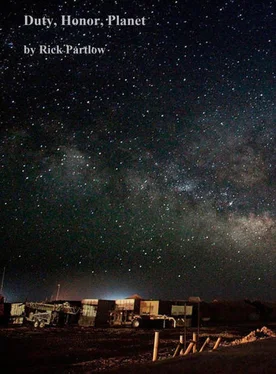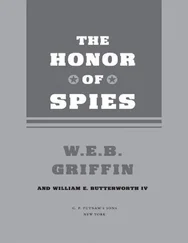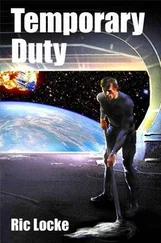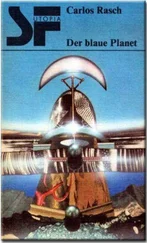“To fortify them against this desert, the Mendozas were generously provided with two buildfoam huts and access to a public well five kilometers away. When I met them, Jorge and Carmella were barely eking out an existence, making only enough to buy a pitifully small quantity of seed each season.” She shot a glance at the hologram, a frown passing over her face.
“How old do they look to you? Forty-five? Fifty? They’re both twenty-five in this picture. This is what life in the hellish Aphrodite desert has done to them. And the tragedy is that they really are among the lucky ones. Aphrodite, north or south, is one of the more hospitable of the exile colonies. On other worlds, these political exiles are left, in effect, to die in environments barely habitable by humans.” A sob seemed to creep into her voice for just an instant. “The infant mortality rate on Loki alone is over forty percent!
“How can we, who consider ourselves civilized, who think of ourselves as the pinnacle of evolution, who call ourselves the most advanced culture in human history, allow this tragedy to occur? How can you, the trustees of our race, the representatives of all humanity, allow this to happen?
“During the research for my thesis, I also visited colonies in the Belt, on Mars and in the Jovians. Conditions there are also harsh, and death is an everyday reality, but there is a difference. The colonists in our Solar System are all volunteers, out of necessity—certain skills are required for admission to these colonies, and a trust is required to preserve the colony. But this natural restriction does not affect the star colonies, and certain members of our international community have taken advantage of this to rid themselves of political and economic embarrassments.” Her face and voice grew progressively sterner, like a fundamentalist preacher decrying the wages of sin.
“This crime against the most helpless members of the human race will not go unpunished. Already, we are reaping its rewards. The uprisings on Inferno and Loki have claimed countless innocent lives, staining the hands of our military with civilian blood.”
Oops, Glen thought, playing a little fast and loose with the facts there. Still, he’d done worse in a few speeches he’d written for the Senator.
“What will our response to this be?” Valerie continued. “Will we finally attempt to eliminate the root cause of the unrest, the unfair and inhuman policy of political and economic exile? Or will we merely repeat the mistakes of the past and use these instances of violence as an excuse to build up a military whose sole purpose is the repression of our fellow citizens?
“The choice is yours, ladies and gentlemen. You can be remembered as the generation that brought the human race to a new moral and ethical height, or you can be vilified as just another bunch of greedy, self-serving politicians. You have the power to make history.” She swept through the crowd with a piercing gaze, and Glen imagined that each one probably felt she was looking at them. “It is not a power to be taken lightly.
“Thank you very much for allowing me to come and address you today.”
Val turned and left the platform as abruptly as she’d begun.
The first one to stand, of course, was her father, but he was quickly joined by nearly everyone in the auditorium, with the notable exception of a few Eastbloc and Southbloc delegates. But even they applauded, and the thunderous ovation echoed off the auditorium’s dome like a cloudburst that washed over Val as she sat down next to Glen.
“You,” Glen mouthed to her, “are absolutely incredible.”
She kissed him, smiling gratefully. She seemed to be entertaining a good case of post-speech shakes, and Glen didn’t think she even noticed the proud smile on her father’s face—or Vice President Lopez quietly slipping out of the building’s rear exit.
Probably sneaking off to report to President Jameson, Glen snorted. Go ahead, Mulrooney taunted him silently. Go tell your boss his days are numbered.
* * *
A gentle spring rain fell quietly on the manicured grass of Senator O’Keefe’s country estate outside Calgary, Alberta. Daniel O’Keefe leaned against his porch railing and watched the night, silently nursing the last glass from the bottle of twenty-year-old Scotch he had broken out earlier that day to celebrate Val’s speech.
Val had gone to bed an hour ago, exhausted by her first bout with the Republic Senate, and Glen had joined her soon after, at Senator O’Keefe’s insistence. He chuckled quietly to himself. They’d been engaged for almost two years, and Glen was still embarrassed that the Senator knew they were sleeping together. How delightfully old-fashioned.
So it had fallen to him to finish the bottle, stored away for just such an occasion. It had been so long ago. Margaret had been with him when he’d picked out that bottle, and another one just like it.
Damn. It had been almost a week since he’d thought of Margaret. Her memory still stung like a whip across his soul. Reluctantly, he turned and paced back into the den, back to the mantle where the holocube rested. It was their wedding picture, taken nearly thirty years ago.
He looked somewhat ridiculous with the loud suit and long hair that had been in fashion at the time. But Maggie… Maggie was so beautiful, so beautiful it hurt to look at her.
He remembered it just like it was last year and not three decades ago. He’d been an idealistic and ambitious young aide to a powerful senator, much like Glen, and she’d been the daughter of the Czech ambassador to Canada. She’d had the most incredible eyes—eyes you could just fall into. Val had those eyes—he could see so much of Maggie in Val. They’d been so much in love and so young.
The call beeper on the room’s comlink shook him from his reminiscence, petulantly demanding his attention. Shaking his head clear, O’Keefe set down his glass, stepped over to his desk and hit the answer control. A young, clean-cut male in a dark suit shimmered into existence in front of the desk, a remote dialing unit in his hand.
“Senator O’Keefe?” he asked.
“You’re speaking to him, son,” the older man confirmed.
“Please hold for the President, sir.” The man disappeared and was replaced by the Presidential Seal.
O’Keefe’s eyebrows rose. Greg Jameson calling him at home? This was going to be good. A few seconds later, the hologram shimmered once more and congealed into the form of a tall, broad-chested black man in a plain, grey suit.
O’Keefe knew that Jameson was in his late sixties, but the man looked just as fit now as when he’d quarterbacked the University of Florida to their ’71 championship season—not a grey hair on that lofty head.
And then there was that face carved from granite by a fusion blast, that face that could cow the most recalcitrant politician, those eyes that held dark, steaming hurricanes in check beneath their calm exterior. Yes, Greg Jameson looked his part.
“Evening, Daniel.” Jameson’s modulated earthquake of a voice came through the transmission.
“Evening, Mr. President.” O’Keefe nodded. “I trust you enjoyed my daughter’s speech.”
“Saw a recording of it about an hour ago. Sorry I couldn’t make it live, but some unexpected business came up.”
Unexpected, O’Keefe thought, laughing inwardly. Right. To Greg Jameson, the end of the world wouldn’t come unexpectedly.
“Quite all right,” O’Keefe assured him.
“It was very impressive,” Jameson allowed. “She’ll make quite the politician.” O’Keefe didn’t thank him—coming from Jameson, it wasn’t a compliment.
“I hope it didn’t upset you unduly.”
“Why should it?” Jameson smiled genially. “I agreed with at least ninety percent of what she said.”
Читать дальше












